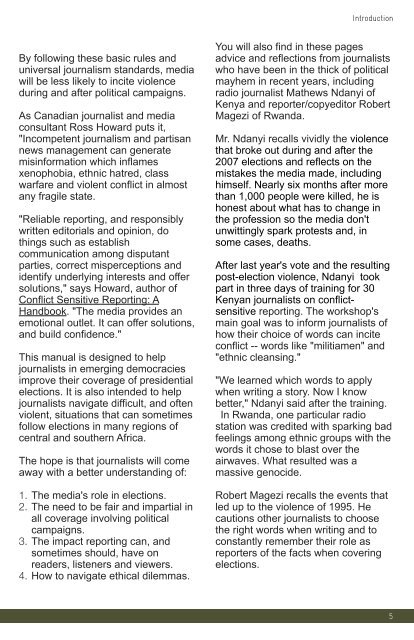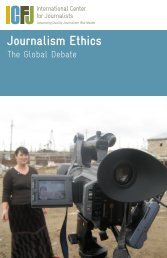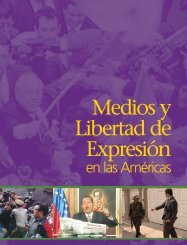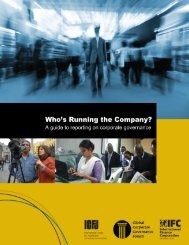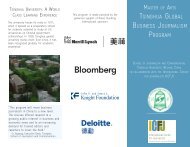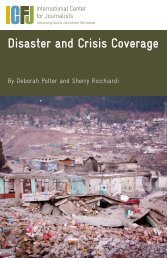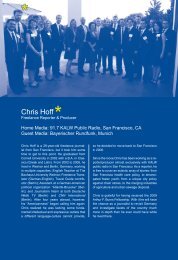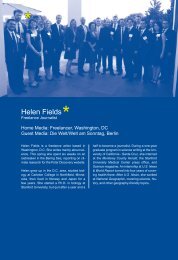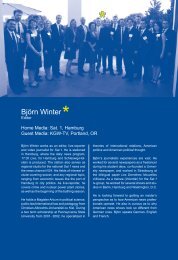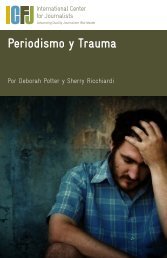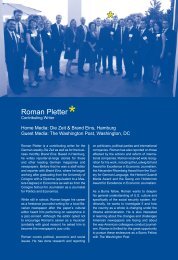Download PDF - International Center for Journalists
Download PDF - International Center for Journalists
Download PDF - International Center for Journalists
Create successful ePaper yourself
Turn your PDF publications into a flip-book with our unique Google optimized e-Paper software.
Introduction<br />
By following these basic rules and<br />
universal journalism standards, media<br />
will be less likely to incite violence<br />
during and after political campaigns.<br />
As Canadian journalist and media<br />
consultant Ross Howard puts it,<br />
"Incompetent journalism and partisan<br />
news management can generate<br />
misin<strong>for</strong>mation which inflames<br />
xenophobia, ethnic hatred, class<br />
warfare and violent conflict in almost<br />
any fragile state.<br />
"Reliable reporting, and responsibly<br />
written editorials and opinion, do<br />
things such as establish<br />
communication among disputant<br />
parties, correct misperceptions and<br />
identify underlying interests and offer<br />
solutions," says Howard, author of<br />
Conflict Sensitive Reporting: A<br />
Handbook. "The media provides an<br />
emotional outlet. It can offer solutions,<br />
and build confidence."<br />
This manual is designed to help<br />
journalists in emerging democracies<br />
improve their coverage of presidential<br />
elections. It is also intended to help<br />
journalists navigate difficult, and often<br />
violent, situations that can sometimes<br />
follow elections in many regions of<br />
central and southern Africa.<br />
The hope is that journalists will come<br />
away with a better understanding of:<br />
1. The media's role in elections.<br />
2. The need to be fair and impartial in<br />
all coverage involving political<br />
campaigns.<br />
3. The impact reporting can, and<br />
sometimes should, have on<br />
readers, listeners and viewers.<br />
4. How to navigate ethical dilemmas.<br />
You will also find in these pages<br />
advice and reflections from journalists<br />
who have been in the thick of political<br />
mayhem in recent years, including<br />
radio journalist Mathews Ndanyi of<br />
Kenya and reporter/copyeditor Robert<br />
Magezi of Rwanda.<br />
Mr. Ndanyi recalls vividly the violence<br />
that broke out during and after the<br />
2007 elections and reflects on the<br />
mistakes the media made, including<br />
himself. Nearly six months after more<br />
than 1,000 people were killed, he is<br />
honest about what has to change in<br />
the profession so the media don't<br />
unwittingly spark protests and, in<br />
some cases, deaths.<br />
After last year's vote and the resulting<br />
post-election violence, Ndanyi took<br />
part in three days of training <strong>for</strong> 30<br />
Kenyan journalists on conflictsensitive<br />
reporting. The workshop's<br />
main goal was to in<strong>for</strong>m journalists of<br />
how their choice of words can incite<br />
conflict -- words like "militiamen" and<br />
"ethnic cleansing."<br />
"We learned which words to apply<br />
when writing a story. Now I know<br />
better," Ndanyi said after the training.<br />
In Rwanda, one particular radio<br />
station was credited with sparking bad<br />
feelings among ethnic groups with the<br />
words it chose to blast over the<br />
airwaves. What resulted was a<br />
massive genocide.<br />
Robert Magezi recalls the events that<br />
led up to the violence of 1995. He<br />
cautions other journalists to choose<br />
the right words when writing and to<br />
constantly remember their role as<br />
reporters of the facts when covering<br />
elections.<br />
5


